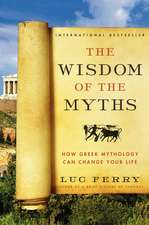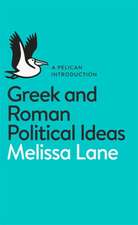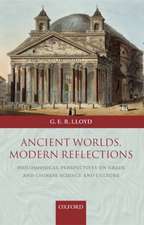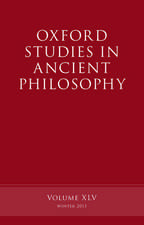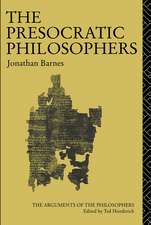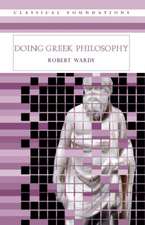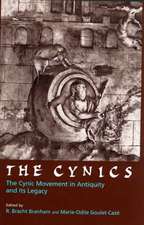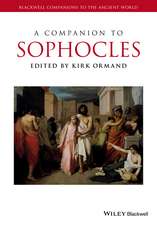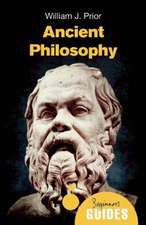Cicero: The Philosophy of a Roman Sceptic: Philosophy in the Roman World
Autor Raphael Woolfen Limba Engleză Paperback – 19 feb 2015
Situating Cicero’s work in its historical and political context, this volume provides a detailed analysis of the thought of one of the finest orators and writers of the Roman period. Written in an accessible and engaging style, Cicero: The Philosophy of a Roman Sceptic is a key resource for those interested in Cicero’s role in shaping Classical philosophy.
| Toate formatele și edițiile | Preț | Express |
|---|---|---|
| Paperback (1) | 391.39 lei 6-8 săpt. | |
| Taylor & Francis – 19 feb 2015 | 391.39 lei 6-8 săpt. | |
| Hardback (1) | 1001.84 lei 6-8 săpt. | |
| Taylor & Francis – 26 feb 2015 | 1001.84 lei 6-8 săpt. |
Preț: 391.39 lei
Nou
Puncte Express: 587
Preț estimativ în valută:
74.89€ • 78.47$ • 61.91£
74.89€ • 78.47$ • 61.91£
Carte tipărită la comandă
Livrare economică 11-25 aprilie
Preluare comenzi: 021 569.72.76
Specificații
ISBN-13: 9781844658411
ISBN-10: 1844658414
Pagini: 268
Dimensiuni: 156 x 234 x 14 mm
Greutate: 0.5 kg
Ediția:1
Editura: Taylor & Francis
Colecția Routledge
Seria Philosophy in the Roman World
Locul publicării:Oxford, United Kingdom
ISBN-10: 1844658414
Pagini: 268
Dimensiuni: 156 x 234 x 14 mm
Greutate: 0.5 kg
Ediția:1
Editura: Taylor & Francis
Colecția Routledge
Seria Philosophy in the Roman World
Locul publicării:Oxford, United Kingdom
Public țintă
Postgraduate and UndergraduateCuprins
Contents
Acknowledgements
Some notable dates
1. Introduction: Cicero and Philosophy
2. Scepticism and Certainty
3. God, Fate and Freedom
3.1. On the Nature of the Gods
3.2. On Divination
3.3. On Fate
4. The Best Form of Government
4.1. The Republic
4.2. The Laws
5. The Good Life in Theory and Practice
5.1. On Ends
5.2. On Duties
6. The Role of the Emotions
Suggestions for further reading
Acknowledgements
Some notable dates
1. Introduction: Cicero and Philosophy
2. Scepticism and Certainty
3. God, Fate and Freedom
3.1. On the Nature of the Gods
3.2. On Divination
3.3. On Fate
4. The Best Form of Government
4.1. The Republic
4.2. The Laws
5. The Good Life in Theory and Practice
5.1. On Ends
5.2. On Duties
6. The Role of the Emotions
Suggestions for further reading
Recenzii
"Woolf offers a careful reading of Cicero's philosophical works. Unlike most similar texts, which approach Cicero primarily as a documentary source for ancient philosophy, Woolf focuses on articulating and evaluating Cicero's own philosophical positions. Overall, this book provides an excellent introduction to Cicero's philosophy. Summing Up: Recommended." - B. T. Harding, Texas Woman's University, CHOICE Review
"Cicero may not always have dotted his i's and crossed his t's, but this did not prevent him from writing significant and inspiring philosophy. Woolf's important and enjoyable book shows us just how good he was at it." - Katharina Volk, Columbia University, BMCR
"Woolf makes a concerted effort to convey the content of Cicero’s works to a readership who have not necessarily read any of the primary texts, let alone the scholarly literature, and he does this summative work very effectively (and with very little off-putting textual work on the Latin)...Woolf writes as a philosopher for philosophers. He expounds and analyses the philosophical arguments that Cicero presents, assessing their cogency and plausibility." - Sean McConnell, University of Otag
"Cicero may not always have dotted his i's and crossed his t's, but this did not prevent him from writing significant and inspiring philosophy. Woolf's important and enjoyable book shows us just how good he was at it." - Katharina Volk, Columbia University, BMCR
"Woolf makes a concerted effort to convey the content of Cicero’s works to a readership who have not necessarily read any of the primary texts, let alone the scholarly literature, and he does this summative work very effectively (and with very little off-putting textual work on the Latin)...Woolf writes as a philosopher for philosophers. He expounds and analyses the philosophical arguments that Cicero presents, assessing their cogency and plausibility." - Sean McConnell, University of Otag
Descriere
In bringing for the first time to a Latin audience the ideas of Stoics, Epicureans and other schools and figures of the post-Aristotelian period, Cicero's philosophical works have had an incalculable influence on the transmission of those ideas through later history. Raphael Woolf describes and evaluates Cicero's philosophical achievement, paying particular attention to his relation to the philosophers he draws upon in compiling his works; his Romanizing of Greek philosophy; and his own sceptical and dialectical outlook. While Cicero's value as documentary evidence for the Hellenistic schools is unquestioned, the book explores his writings as works of philosophy that do more than simply synthesize the thought of others but offer a unique viewpoint of their own. The book aims, using the best tools of philosophical, philological and historical analysis, to do Cicero justice as a distinctive philosophical voice.


